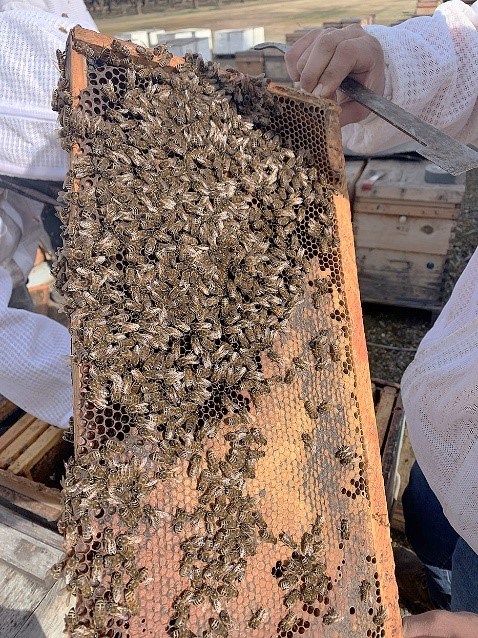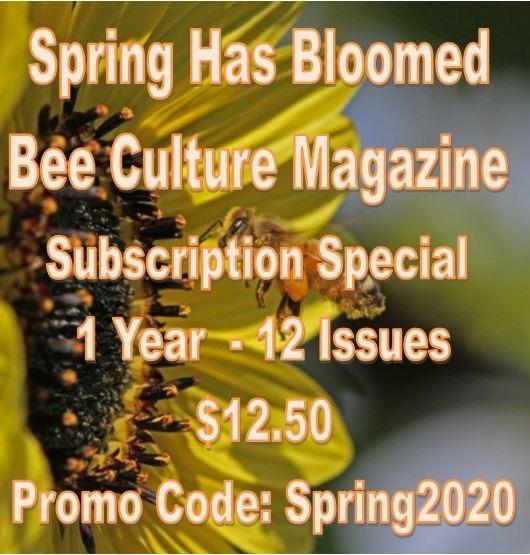Mushroom Extract Might Rescue Bees from Deadly Virus
By: SIERRA DAWN McCLAIN – Capital Press
Life is tough for the honeybee, but new research may save colonies by using mushroom extracts as feed additives to combat a devastating virus.
Researchers from Washington State University are working on a field experiment with 72 hives this month in California’s San Joaquin Valley, where beekeepers have hauled their hives for the annual almond orchard pollination.
Honeybees, worth almost $20 billion to American agriculture, are dying at alarming rates, threatening honey production and crop pollination. According to the Bee Informed Partnership, from 2018 to 2019, U.S. beekeepers lost 40% of their colonies.
Researchers call this “colony collapse disorder” and attribute much of it to the deformed wing virus, so-named because of how it disfigures bees’ wings. The virus, according to entomologist Laura Lavine of Washington State University, undermines a bee’s immune system, robs it of flight and halves its lifespan.
“It’s a tragedy for our bees,” said John Jacob, a beekeeper at Old Sol Apiaries in Rogue River, Ore.
The deformed wing virus is transmitted by a parasitic mite called the varroa destructor, a tiny, button-shaped, eight-legged creature that latches onto bees and feeds on their tissues.
Scientists say their California experiment may offer a solution to the virus: mushrooms.
Walter Steven Sheppard, lead researcher on the project and an entomologist at WSU, said the fungi he’s using are classified as Ganoderma lucidum, also called lingzhi or reishi. These are rust-colored, kidney-shaped “shelf” mushrooms that grow like fans on trees. Sheppard said he has also experimented with the genera Fomes. Both belong to the fungi order polypores, and their extracts have long been prized in Asian medicine for supposed antiviral properties.
The researchers say the idea of using mushrooms to cure bees was the brainchild of Paul Stamets, a prominent mycologist and founder of Fungi Perfecti, a medicinal mushroom business in Olympia, Wash.
In 1984, Stamets noticed bees from his personal hive landing on mushrooms and sipping droplets of liquid from each mushroom’s mycelium, the delicate web of filaments. Decades later, around 2016, he had an epiphany: perhaps the bees had not just been seeking sugar, but were self-medicating.
Sheppard, one of the world’s leading bee experts, said Stamets approached him with his theory a few years ago and a partnership was born. They soon collaborated with scientists from the U.S. Department of Agriculture and WSU.
The researchers dosed sugar-water feeders with mycelium extracts from several mushroom species, analyzing the effect on bees.
In field and lab studies, treated bees fared better when infected by the virus. In cages, treated bees had an 800-fold decrease in virus level; in the field, the decrease was 44- to 79-fold, still significant.
Sheppard said it’s not yet clear how the extracts reduce virus levels. He said the mushrooms are either bolstering the bees’ immune systems or restraining the virus directly, and it will take more lab work to find out.
The field work, Sheppard said, will last until mid-March.
“We’re down here today feeding some of the bees one type of mushroom extract, some another type and the control group just sugar syrup,” Sheppard said Monday. “This experiment is keeping us pretty busy. It’s exciting.”
After field tests, the team will bring back samples and analyze them in the lab for another month or longer. Nick Naeger and Jennifer Han, pollinator researchers at Washington State, will lead lab work.
Sheppard said mycelium extracts might become available for beekeepers to use in 2020. His team, he said, is working with the U.S. Food and Drug Administration and other groups to get the extracts registered as a feed additive for bees.
“I’m encouraged,” said Sheppard. “I think what we’re doing has the potential to be commercial soon. Beekeepers I talk to are really looking forward to using the material. I think we’ll get approval this year.”
Jacob said, as a beekeeper, he’s honored to be part of the experiment.
“The beekeeping industry is in deep trouble right now,” said Jacob, “and I think this is going to make a big difference.”
https://www.capitalpress.com/ag_sectors/orchards_nuts_vines/mushroom-extract-might-rescue-bees-from-deadly-virus/article_6ea225da-51de-11ea-b658-f70bea196741.html
______________________________________________________________________________________________________________________________________
Spring Subscription Special – 1 Year to Bee Culture for $12.50
Online Order ONLY!
www.beeculture.com
Promo Code: Spring2020








